Your cart is currently empty!
High Blood Pressure
So many people today are on high blood pressure medications. Most people who are insulin resistant also have high blood pressure. Insulin resistance is directly caused by a high-sugar, high-grain (even complex carbs) diet. High blood pressure and uncontrolled blood sugar go hand in hand. Typically, as insulin increases, so does blood pressure. Insulin stores magnesium, but if your insulin receptors are resistant and your cells grow resistant to insulin, you can’t store magnesium, so magnesium passes out of your body through urination. Magnesium in your cells relaxes your muscles. If your magnesium level is too low, your blood vessels constrict rather than relax, which raises your blood pressure and decreases your energy level. Most Americans are deficient in magnesium.
Insulin also affects your blood pressure by causing your body to retain sodium. Sodium retention causes fluid retention. Fluid retention, in turn, causes high blood pressure and can lead to congestive heart failure.
To enhance your heart health, first remove all grains and sugars, especially fructose, from your diet until your blood pressure and weight are under control (and insulin signaling is thus restored). Eating sugar and grains—including any bread, pasta, corn, potatoes, or rice—will cause your insulin levels and your blood pressure to rise.
Fructose is a sugar that can be metabolized only by the liver; the liver breaks down the fructose into a variety of waste products—including uric acid—that are unhealthy for your body. Uric acid drives up your blood pressure by inhibiting the nitric oxide in your blood vessels. Nitric oxide helps your vessels maintain their elasticity, so nitric oxide suppression leads to increases in blood pressure.
MODIFICATIONS TO YOU KETO DIET
Eat keto and avoid all foods that boost insulin levels. Even whole grains rapidly break down to sugars. Complex carbs are just glucose molecules joined together in long chains. Balance your omega-6 to omega-3 fat ratio. Most people eating a standard American diet have a ratio omega-6 to omega-3 fats of 25:1, which is super-unbalanced. The ideal ratio is 1:1. To achieve this ratio, reduce the amount of vegetable oil in your diet and consume foods that contain high-quality, animal-based sources of omega-3s.
SUPPLEMENTS
Vitamin D: Healthy vitamin D levels can have a strong effect on normalizing blood pressure. Low levels are associated with an increased risk of heart disease. Vitamin D has a positive effect on diabetes. You can get a blood test to check your vitamin D levels. If your level is lower than 45, get some sun exposure and consider taking a supplement; we recommend 1,000 IU per 25 pounds of body weight to maintain vitamin D levels. However, try to keep your vitamin D level lower than 70. Make sure you take vitamin D while eating a food that contains fat because vitamin D is fat soluble, and every cell in your body has a vitamin D receptor.
Magnesium glycinate: Many people are deficient in magnesium because our food and water supplies don’t contain the levels of magnesium they once did, so a supplement is necessary for most people. If you supplement magnesium, you need to take a very absorbable form of magnesium. We recommend 400 milligrams of magnesium glycinate when you wake because blood pressure is highest in the morning. (Do not use magnesium oxide or citrate because it will just cause loose stools.) Take another 400 milligrams just before bed to help your blood vessels relax.
L-carnitine: L-carnitine helps increase energy, weight loss, and focus, and it decreases triglycerides. It is an amino acid that shuttles fatty acids into the mitochondria—the “fat-burning powerhouses” in your body. Also, L-carnitine helps restrict the buildup of fat around the liver and heart. Take 3 grams in the morning on an empty stomach; taking L-carnitine later in the day can affect your sleep.
CoQ10: This is a coenzyme that increases mitochondria building. It is in the mitochondria where fat is oxidized, which keeps cells and liver more sensitized to insulin. Take 400 milligrams of CoQ10 with the first meal of the day.
Understanding Root Causes:
Underlying insulin resistance is a root cause of many cases of High Blood Pressure. So make sure to read THIS article on reversing insulin resistance.
Full Detailed Supplement Plan:
For a detailed supplement plan for high blood pressure CLICK HERE.
For a personal health assessment to get a customized supplement plan CLICK HERE.
